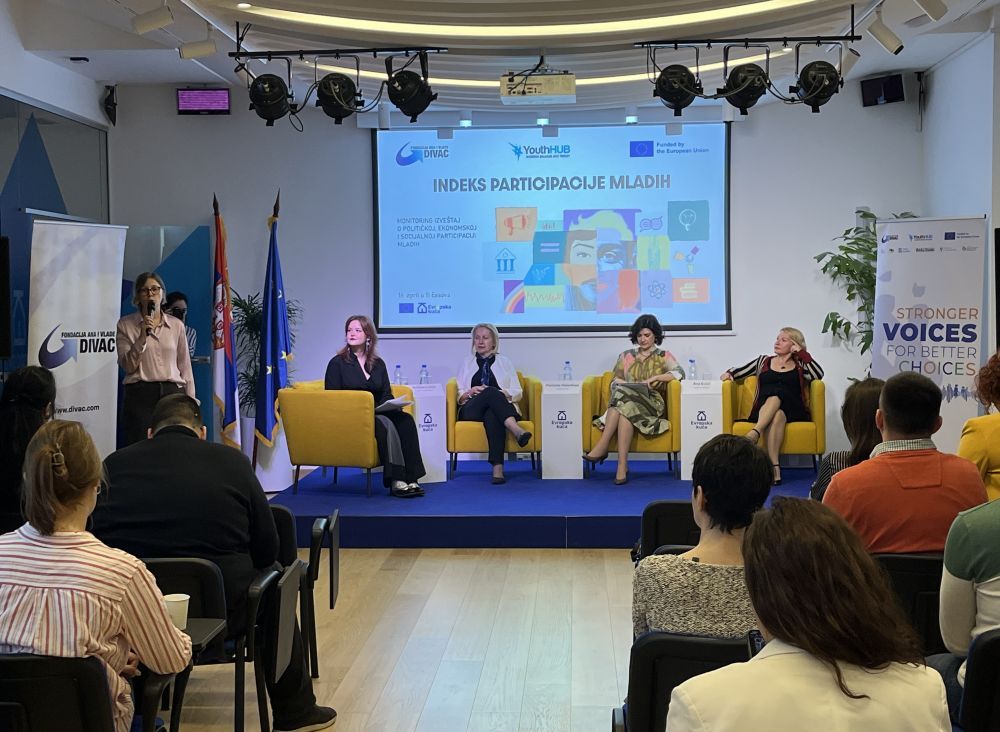According to the latest data from the annual regional Youth Participation Index, in 2023, 18.5% of young people aged 15-29 in Serbia were unemployed, marking a 1.4% increase compared to the previous year's figure of 17.1%.
At the presentation of the eighth annual edition of the regional Youth Participation Index (YPI), which covers data for 2023, attention was drawn to the insufficient representation of young people in political life across the Western Balkans and Türkiye, their exclusion from employment and education, and risks such as long-term unemployment and poverty, especially for young women and those living in rural areas.
The special focus of the eighth edition of the YPI is on the institutional participation of young people in politics. It shows that young people are among the least represented groups in parliaments in the Western Balkans and Türkiye, with less than 5% representation. During the period covered by the research, there were no ministers under the age of 30 in the governments of the region, and the number of deputy ministers from this age group was almost negligible.
"Youth political participation is an important topic for everyone, especially since the results of the Index are one of the data sources for decision-makers to create evidence-based policies and prioritize activities in the field of youth policy. Active youth participation in society is recognized in the Youth Strategy of the Republic of Serbia for the period 2023-2030, primarily through a special goal: 'Youth are active participants in society at all levels,' and through five measures for its implementation. Youth participation in all processes, as well as respecting the principle that no one is left behind, is a prerequisite for the progress of any society," said Snežana Klašnja, advisor for youth policy at the Ministry of Tourism and Youth.
For eight years, the Youth Participation Index has been published as a mechanism to gain insight into the broad political, economic, and social context that can empower or hinder youth participation in society. Covering an eight-year series of data collected from 2016 to 2023, the YPI provides a comprehensive overview of opportunities for young people through the lens of 25 indicators of political, economic, and social participation.
"As active citizens, young people can hold institutions accountable, advocate for democratic values, and promote transparency in institutional actions. This is particularly important for the Western Balkans region, which is actively working on strengthening democracy, the rule of law, and human rights within the EU accession process. The European Union is ready to support projects that strengthen regional cooperation and put the principles of participatory democracy into practice," said Plamena Halacheva, Deputy Head of the EU Delegation to Serbia.
"We at the Ana and Vlade Divac Foundation firmly believe that youth participation, as well as their education and economic empowerment, are key to the development of a society. We see the Youth Participation Index as a unique regional comparative methodology for collecting data and monitoring youth involvement in decision-making processes in the political, economic, and social spheres. The Index analyzes the situation across the entire Western Balkans and Türkiye on these topics, allowing us to identify common challenges, potential solutions, and a series of recommendations to improve the position of young people in the region," said Ana Koeshall, Director of the Ana and Vlade Divac Foundation at the conference opening.
The Youth Participation Index represents a concrete tool for decision-makers and civil society organizations in creating programs tailored to the real needs of young people and provides the opportunity to monitor positive or negative trends, significantly contributing to planning further steps to improve the position of youth.
Each year, the Index specifically highlights the position of young people who are neither employed nor in education or training, i.e., young people in NEET status.
"In the areas of economic and social participation, year after year, we record data that nearly one in four young people in the region is in NEET status, and young women between the ages of 25 and 29 are particularly vulnerable. According to the latest data, over 19% of young people in Serbia are at risk of poverty, which practically means that about 200,000 young people live on less than 300 euros per month. When we add to this the fact that over 15% of them are recipients of social assistance, we can conclude that there is still much work to be done in improving the position of young people," said Mirjana Mirosavljević Bobić, Project Manager of the "Stronger Voices for Better Choices" project at the Ana and Vlade Divac Foundation.
Click on the link for the full Youth Participation Index Monitoring Report 2023
